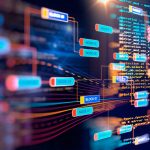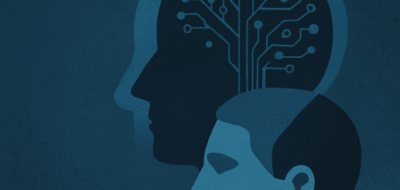Climate change, with deforestation, melting glaciers, mass extinctions and carbon emissions, is the biggest problem of the century. If you struggle to understand what is ruining our planet, perhaps you should look for clues in artificial intelligence. Oceanographers, biologists, and meteorologists successfully use a host of applications that allow you to see Earth from a whole different perspective.
Apocalypse according to the UN
As I was writing this post, I came across a dozen or so of articles on climate change. I never searched for this information. Some of it came to my mailbox in the form of headlines, the rest I came across easily on major websites. All of it had been published a day, if not hours earlier. The gist of each story was nearly identical to what I found in the New York Times: “… The world’s land and water resources are being exploited at unprecedented rates, which combined with climate change is putting dire pressure on the ability of humanity to feed itself…” A similarly somber mood dominated each of the other articles, many of which struck truly apocalyptic tones. And no wonder. A sense of a looming disaster is dawning on all of us.
And yet the sun is kind
This may sound provocative but I think that there is light at the end of the tunnel in which we have all found ourselves. This may be a mere coincidence but it gives me hope: the common concern for the health of our planet coincided almost to the year with the acceleration of technological advances in the last two decades. Hence, digital business developers grew up naturally aware of the poor shape our climate is in. No wonder that startups and multinationals alike increasingly put pro-ecological ideas into their business DNA and engage in the fight to heal our planet. According to optimists (of whom I am one), it is the huge potential of modern technology that makes possible the realization of progressive sustainable development ideas. With the rapid growth of the processing power of computers and the volumes of data available for analysis and machine learning, the speed of deployment of new solutions and the rate of cross-cultural recognition of the many benefits of technology, the groundwork is laid for positive change that may well come sooner than expected.
Machines fixing the climate
The pro-ecological potential of artificial intelligence is enormous. Popular GPS technology provides meteorologists with data on wind direction and strength, air and ocean temperatures, and climate change. Big Data supports the processing of large datasets on historical events. They add to the body of knowledge we have on water and air quality, temperature patterns and the condition of forests. Machine learning algorithms allow the rapid creation of many alternative climate change models. Such simulations can help officials and politicians pursue an informed climate policy. The scientists who observe the harm to animal populations use applications to digitally tag animals, which allows researchers to observe their migrations and behaviors. The natural next step in the evolution of silicon machines, i.e. quantum computers, seems to be perfectly suited for such applications. After all, qubits seem to be ideal for handling algorithms and probabilistic models.
Green energy in cities
Spectacular changes may result from the use of artificial intelligence in construction. Intelligent control systems can reduce energy consumption in buildings by analyzing weather forecasts and the demand for heating, cooling and lighting. Machine learning can also optimize shipping routes, minimizing planning inefficiencies (the age-old problem of traveling salesmen), and reducing carbon emissions in supply chains. Autonomous vehicles relying on machine learning could in time correct traffic patterns for better economy thus benefitting the environment. While devices that rely on technology to make complex analyses and forecasts will not fix the climate any time soon, they may slow the damage. One thing that is sure is that they will help us understand how serious the climate problem has become.
The awakening of giants
It is best to start fixing the planet in one’s own backyard. I am optimistic that the companies that have the required financial resources, research potential and intellectual capital will realize their role and responsibilities. Google boasted being able to use Deep Mind algorithms to cut the cost of cooling its device by up to 40%. Amazon and Facebook’s decisions to launch large-scale data centers helped the environment by reducing energy consumption as they increased power density. Apple is on a mission to turn its entire supply chain into a closed-circulation system that generates no waste. Other noteworthy projects make people aware of what is happening with the climate and what can be done to fix it. Such projects also provide tools and, importantly, funds for these purposes. Since 2017, Microsoft has been implementing its five-year “AI for Earth” program of funding scientists with environmental projects. $50 million has already been allocated to developing AI in agriculture, biodiversity, environmental protection, climate change and water management. The program has already funded over 200 teams using artificial intelligence to manage environmental systems. Scholarship holders can share the outcomes of their work in the cloud, which allows them to collaborate with other teams and create larger projects for sustainable development. Intel works with a surgical drain producer to monitor the forests of Costa Rica. By gathering information on tree health and biomass, the project provides invaluable insights into the impacts of carbon emissions. The Chinese company Ant Financial has launched Ant Forest, an application that encourages social networks to reduce their carbon footprint through gamification. By 2018, over 300 million people had registered, leading to the planting of more than 10 million new trees and reducing carbon footprints. Many such projects are being carried out all over the world.
Earth awaiting leaders
The tech industry has three huge things going for it: its command of technology, its financial resources and its ability to influence public opinion. Still, it needs leaders capable of convincing decision-makers that we already have all the tools we need to achieve improvements and that all that is left to do is to change people’s awareness, so that “environmental friendliness” is recognized as equally worthy of our efforts as “profitability” or “efficiency”. Perhaps we need unprecedented gestures that would show the way to other industries. Would Facebook, Twitter and Google violate business rulebooks if they prioritized the advertising of low-emission products and promoted apps helping to reduce harmful emissions? Is it unrealistic to ask for special care to be given to the developers of applications that benefit oceanographers, biologists, and meteorologists?
The earth is sick, and the causes of its disease lie in our choices, our myopia, and our lack of imagination. We, the humans, have turned out to be the strongest allergen and pest, and an organism that runs counter to nature. If our own intelligence is not up to the task, we need to waste no time deploying the artificial kind. The stakes we can fight for together are very high.
. . .
Works cited:
New York Time, Christopher Flavelle, Climate Change Threatens the World’s Food Supply, United Nations Warns, Earth, Link, 2019.
Deepmind, Richard Evans, Jim Gao, DeepMind AI Reduces Google Data Centre Cooling Bill by 40%, Link, 2020.
China Daily, Kong Wenzheng, Alibaba-linked Ant Forest wins top UN green award, Link, 2020.
Global Wildlife Conservation, Lindsay Renick Mayer, Winners of AI for Earth Innovation Grants Poised to Address Urgent Environmental Challenges with Creative Use of Technology, Global Wildlife Conservation and Microsoft Award Nearly $450,000 Total to Five Cutting-edge Projects with Global Implications, Earth Link, 2020.
. . .
Related articles:
– Algorithms born of our prejudices
– How to regulate artificial intelligence?
– Will AI save the labor market?
– Artificial Intelligence is an efficient banker










TomK
we homo sapiens are sick. the earth will be fine when we are gone
Zoeba Jones
Interesting. Aren’t we doomed already? Right?
Aaron Maklowsky
Advanced AI + oppressive dictatorship is a scary combination. Dictatorships are going to be a lot more effective at suppressing dissent when their AI can identify true political threats with nearly 100% accuracy. Night of the Long Knives will be very surgical.
Laurent Denaris
Elon read this same news story, then started talking about World War 3 being a war of AI’s, like in a movie. By logical definition, this news is not a support for his reaction to it.
Elon is actively profiting off the proliferation of self-driving vehicles. This surge of automation is actively dismantling economic opportunities for real humans, a far better precursor to global conflict than computer fights.
Don’t give Elon Musk more fuckin’ clout for this fuckin’ nonsense. He is not perceiving the future with any accuracy, he is feeding his own broken emotional worldview. He should hire a personal assistant to deal with this shit.
Zoeba Jones
https://hbr.org/podcast/2020/10/how-gpt-3-is-shaping-our-ai-future
John Macolm
Reminds me of some Japanese anime where it’s a dystopian future where various AI superpowers destroyed each other because a machine can only assume a pyrrhic victory is still a victory, even if it involves scorched earth.
Jang Huan Jones
I have mixed opinions about this, mostly stemming from the fact that AI is such a broad field, that making ominous statements about ‘AI’ as a whole makes it really hard to argue against it. Like, what aspects specifically of AI are dangerous? Computer Vision? NLP? Machine learning? Data Science? RL? On one hand, I can see that the implications of autonomous tanks are a big deal. Weapons with ‘augmented aiming’, or something like that, which might come out of CV. On the other hand, things that Elon worries about (like AI declaring war on its own) feel so far away as to be almost a non-issue entirely.
Mac McFisher
A benevolent AGI would create abundance for everyone, and liberate the oppressed masses with replicators, waifus, and immortality pills.
Laurent Denaris
As a machine learning researcher from Russia, all I can say is “Ha-ha”. I do not believe that such a project can be guided by the government here. I’m certain that there would be a lot of money involved, an a lot of corruption. And the actual “researchers” would probably come up with some bullshit like rename a simple opensource chatbot or something.
Andrzej44
is it too late for us ? already ?
Andrzej
Ecologists have a variety of tools for collecting and analyzing data, but relatively few tools that facilitate ecological reasoning. Up to this time, simulation models have been the basic means of organizing ecological knowledge in a way that can be rapidly processed by computer.
Grzegorz Wiatr
The opportunity we have is equal to the huge threat that depleting of Earth’s resources presents. There are great insights about the AI topic and our ability to leverage it for the challenge in “21 Lessons for the 21st Century” by Yuval Noah Harari, which I wholeheartedly recommend.
Simon GEE
Nice. What an insightful and un-common way of presenting AI in context of humanitarism. Thank you Norbert! Possibilities and the way forward presented in your article could address Stephen Hawking’s worry that “AI could spell the ned of human race” (once AI is used un-ethically)
John Macolm
As much as I disagree with Elon Musk, I think he very well could be correct on that assumption.
Adam Spikey
We don’t need AI to tell us what is wrong, it’s really simple, it’s a little thing called “never enough”, it’s the consequence of replacing “being” with things.
Mac McFisher
Well, social media and companies like Cambridge Analytica are making that seem like a reasonably possible outcome. We’re already perfecting manipulation based on info that’s been gathered on individuals and groups for years now.
I can’t wait to see how an incredibly smart AI would use that.
That’s just great.
Jang Huan Jones
I’m so glad to see someone else saying this. I work in AI and I feel like when Elon (whom I’m a big fanboy of) and others talk about it, they make it seem like something it isn’t. They paint a picture that AI is this giant being awaiting to develop sentience. There are so many branches of AI and so many teaching methods that it’s just not as simple as they make it sound. Now, I’m new to this industry and am not a scientist, but I know more than the average person and, to me, people are making this into a bigger deal than it is.
Guang Go Jin Huan
This technology will be funded by the wealthiest individuals in the world. Therefore, it’s their own world views, philosophies and morality that will be reflected in how these AI’s work. This fact should be profoundly disturbing to any rational human being, rich or poor, capitalist or communist, gay or straight, atheist or religious.
Tom Aray
Good thing we have a reality tv star “business man” in charge with all those tremendous tweets, and absolutely no clue about how to even spell A.I.